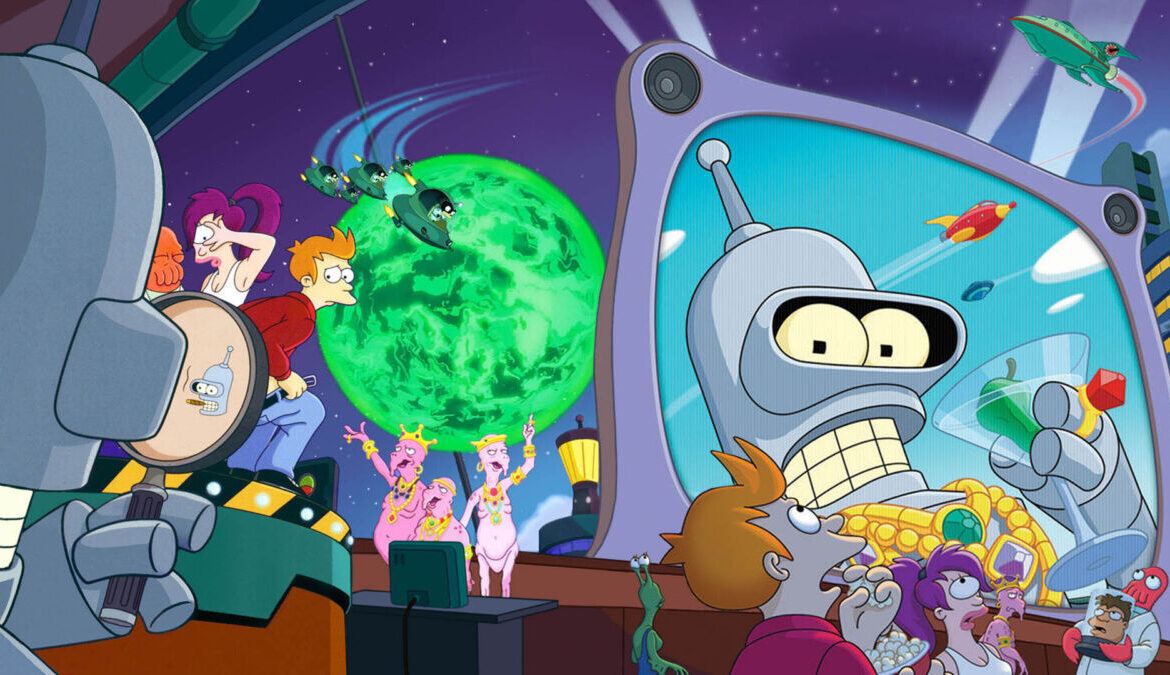25. Game of Tones | Season 10, Episode 10
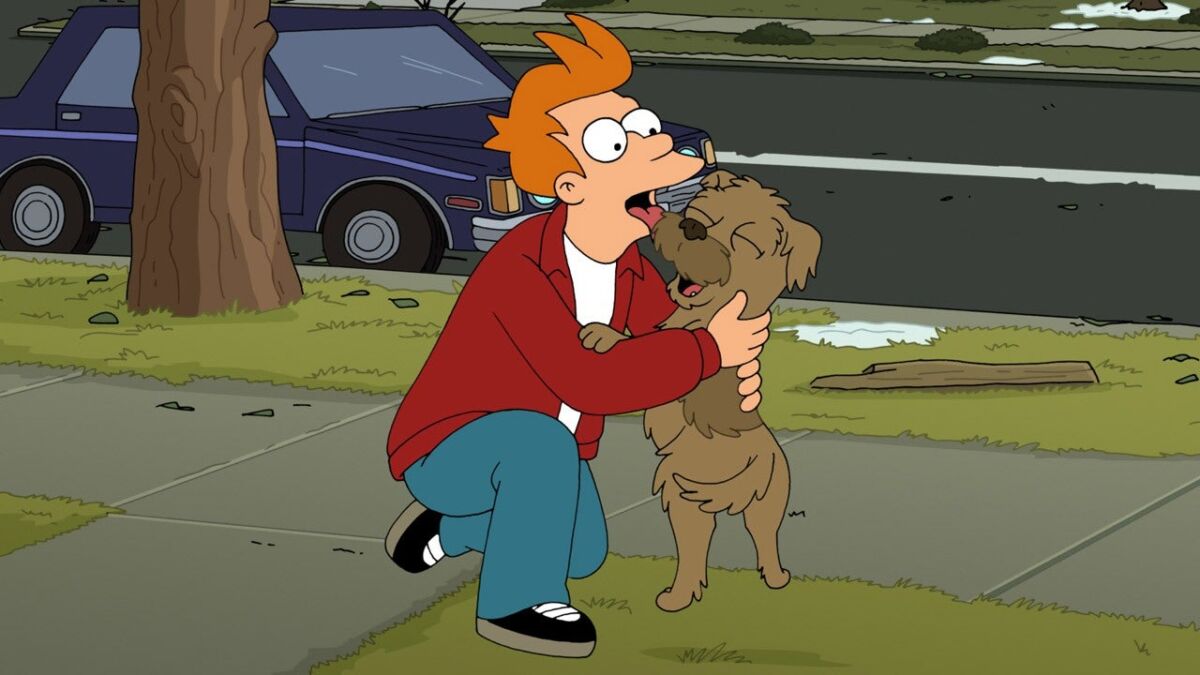
“I guess the memory is gone forever. Like Kaboom cereal. And my family.”
Season 10 really put together a great run as Futurama’s time on the airwaves drew to a close.
The first of the four final (and best) adventures sees the Planet Express crew taking an Inception-style trip into Fry’s brain to figure out the source of a strange alien noise that is driving the entire planet to distraction. As Fry delves into his old memories, however, he becomes increasingly distracted owing to his desire to spend more time with the family he left behind.
What makes Game of Tones such a strong and worthy entry is that it shares so much of what made the best Futurama stories great: clever structure, identifiable characterisation and an emotionally significant, well-earned payoff.
It’s not quite up there with the sort of top-tier content that really made Futurama such a classic, partly due to the fact that it struggles to incorporate many other characters into its narrative and lacks the razor sharpness of earlier seasons, but, appropriately enough, the episode that delves into the past is a great reminder of what made the futuristic series so great in the first place.
24. Time Keeps on Slippin’ | Season 3, Episode 14
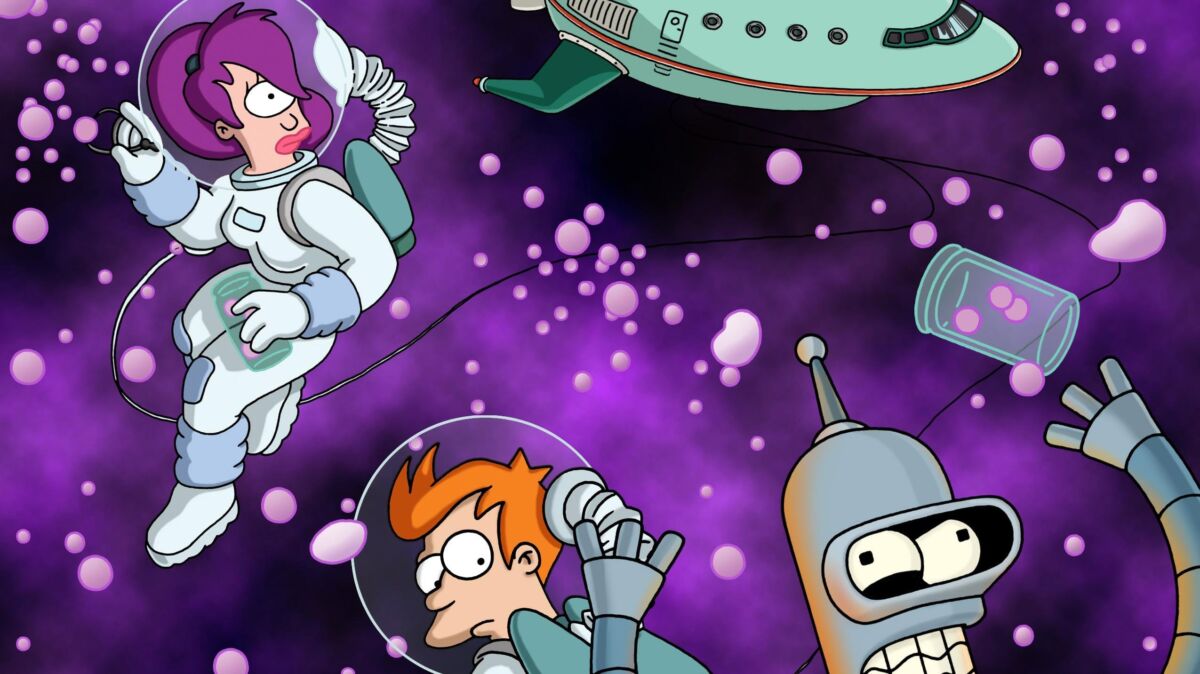
“You still have Zoidberg. You all still have Zoidberg!”
As far as setups for Futurama adventures go, Time Keeps on Slippin’ has to be up there as one of the most nakedly unusual and unapologetically nonsensical. In fact, the episode’s opening, in which the Harlem Globetrotters (now an alien civilisation) land on Earth and challenge its inhabitants to a game of basketball “for no reason” and with “nothing at stake and no threat.” Farnsworth accepts, creates a mutant team of his own using time-accelerating particles, and before you know it, the fabric of time is skipping forward to the alarm of all. It’s the high concept time travel / basketball crossover you didn’t know you needed.
This being Futurama, however, there’s not a moment where you question just how ridiculous the setup is as Farnsworth and his gang of alien super-ballers race against time to stop it from disrupting the integrity of the entire universe.
Clever, high-stakes and with yet another slam-dunk of an ending, Time Keeps on Slippin’ is Futurama marrying its many great components to slick effect. The Globetrotters’ pre-eminence as some of the universe’s finest mathematical and scientific minds (alongside their sporting prowess), meanwhile, has always been one of the show’s most underappreciated running gags.
23. Bender’s Big Score | Season 6, Episode 1
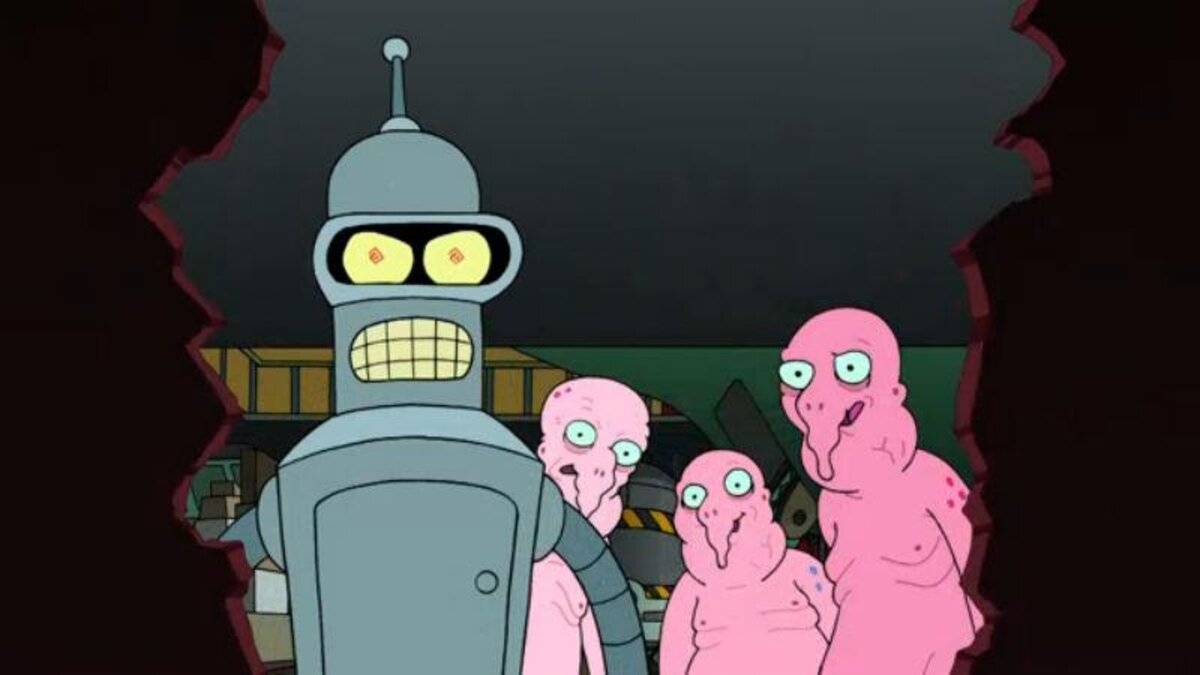
“I don’t get it. How can you say Lars is more mature than me?”
“Well, for one thing his checkbook doesn’t have The Hulk on it.”
The first-ever feature-length Futurama movie is also probably the best. The quality of the show’s specials did vary somewhat, the weaker offerings usually considered to be the slightly disquieting tentacle-laden narrative of The Beast With A Billion Backs and the somewhat underwhelming eco-focused Into The Wild Green Yonder.
Bender’s Big Score, however, comes out on top as the highest-rated special of all. The plot sees scammers staging a takeover of Planet Express and travelling back in time to steal some valuable treasure, a weird concept on paper that works far better in its actual execution.
The reason it works so well is that none of that which made the smaller episodes of the show is lost when expanded into a larger format. The same character dynamics, effortlessly brilliant dialogue and an indulgence in many of the sci-fi tropes that Futurama so often subverted, all amplified in an episode that feels like it was made specifically for loyal fans. In terms of feature-length storylines, Bender’s Big Score feels like the most authentically ‘Futurama’ of them all.
The episode is also bolstered by a seriously strong voice cast that sees the likes of Coolio, Al Gore, Tom Kenny, Mark Hamill and Sarah Silverman join an already exceptional cast to give Bender’s Big Score the sort of heavyweight talent a full feature demands. Expansive, smart but rarely derivative, Bender’s Big Score is the feature-length Futurama outing of choice.
22. Fry and the Slurm Factory | Season 2, Episode 4
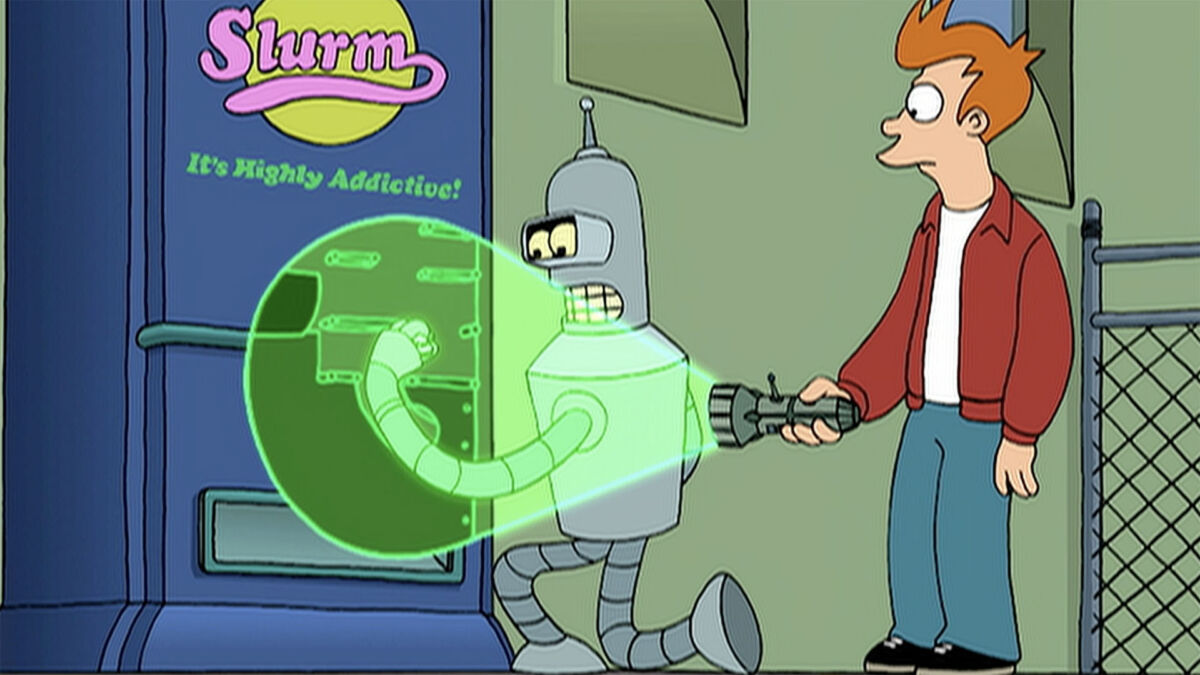
“Who are those horrible orange creatures over there?”
“Why those are the Grunka-Lunkas. They work here in the Slurm Factory.”
“Tell them I hate them!”
When the makers of popular soda Slurm announce a contest in which whoever finds a golden bottlecap inside a can wins a free tour of the Slurm factory, Fry and Bender use Professor Farnsworth’s ‘F-Ray’ to scout out the elusive cap and get themselves onto the tour of their dreams. It all sounds so familiar…
Fry and the Slurm Factory is, of course, a naked parody of Charlie and the Chocolate Factory, easily one of the most pastiched and well-known cultural properties in existence, but it doesn’t really matter because it’s so well done and so lovingly made that any worries about being too derivative are allayed by what essentially amounts to a very enjoyable time.
Professor Farnsworth’s derisory comment towards the Slurm Factory’s workers, for instance, still ranks highly as one of the funniest lines in the show’s entire history.
21. Where No Fan Has Gone Before | Season 4, Episode 12
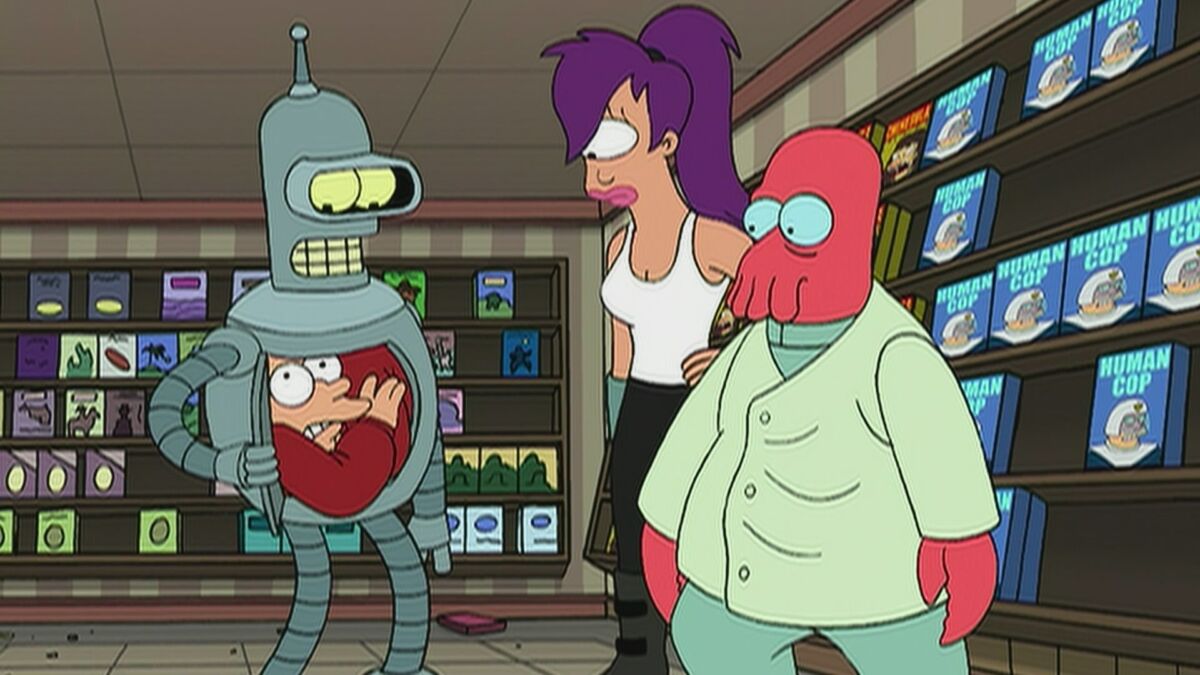
“I feel like hugging you. But you have no body…and we’re both men.”
You cannot escape Star Trek. Be it remakes, reruns, parodies or references, Star Trek still retains its unbelievably pervasive grip on popular culture even today. Beavis and Butthead, The Simpsons, The IT Crowd, SNL, Big Bang Theory, Family Guy, South Park, Extras, Community, it was pretty much inevitable that the talented nerds working in TV would end up paying homage to the pinnacle of geek culture at almost any given opportunity.
Futurama is, of course, a partial parody of Star Trek anyway, but Where No Fan Has Gone Before straddles the line between indulgent love-in and aware self-critique beautifully. In having the episode’s antagonist, Melllvar, portrayed as an insecure 30-something alien still living in his parent’s basement.
Plus, Trekkie or not, it’s undeniable fun seeing the likes of Nimoy, Shatner and Takei slipping back into their old roles, tongues firmly in their cheeks as they ham it up to become the most parodic versions of themselves possible. Oh my!
20. War is the H-Word | Season 3, Episode 2
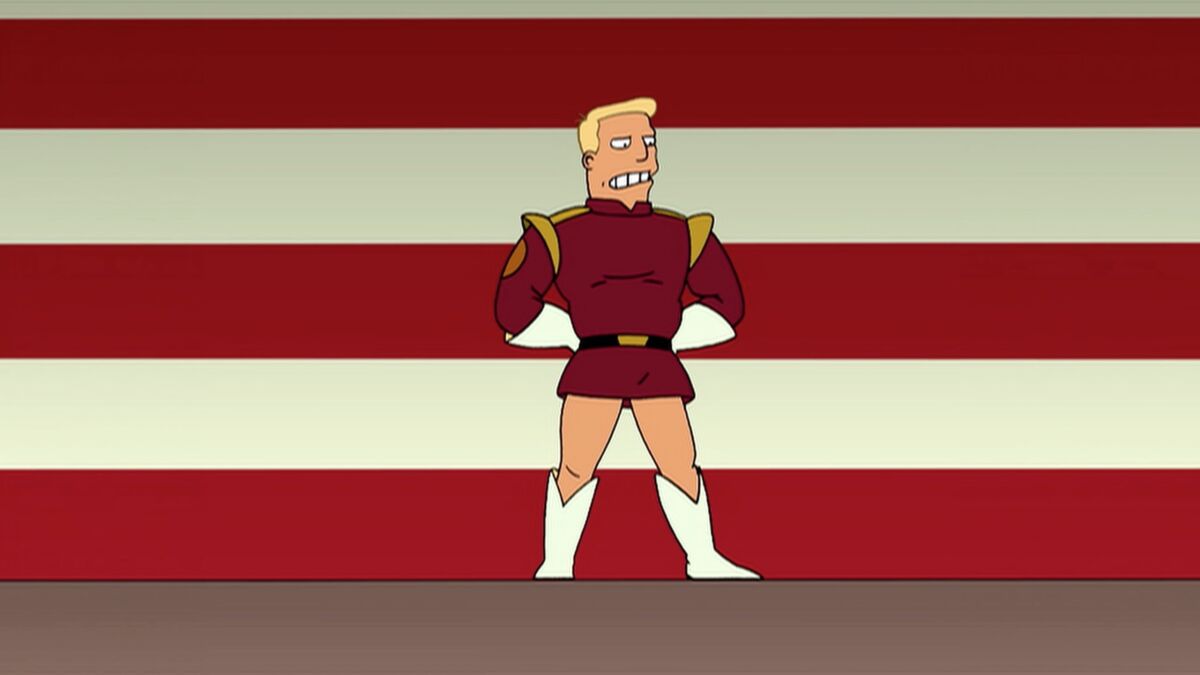
“We know nothing about their language, their history or what they look like. But we can assume this. They stand for everything we don’t stand for. Also, they told me you guys look like dorks!”
Fry and Bender enlist in the army to receive a 5% military discount on chewing gum, a reason so ridiculous and arbitrary that it could only have come from a show like Futurama. With Leela tagging along in disguise as Lee Lemon as per Mulan, the trio quickly come to realise that the conquest of Spheron I is not perhaps not taking place for the right reasons or with any degree of real competence from the eternally egotistical commanding officer Zapp Brannigan.
It’s all been seen before, of course, but Futurama is often at its best when it’s being nakedly parodic. By making the inhabitants of Earth the undisputable aggressors, War is the H-Word serves as a direct parody, or possibly an homage both to iconic 70s sitcom MASH and Paul Verhoeven’s deeply satirical 1997 space epic Starship Troopers in which a race of alien bugs face extinction from the assault of the eponymous troopers.
This being Futurama, of course, it’s a planet populated entirely by large, sentient bouncing balls instead, but the effect is much the same. If a little less gory. And without Neil Patrick Harris.
19. Murder on the Planet Express | Season 10, Episode 11
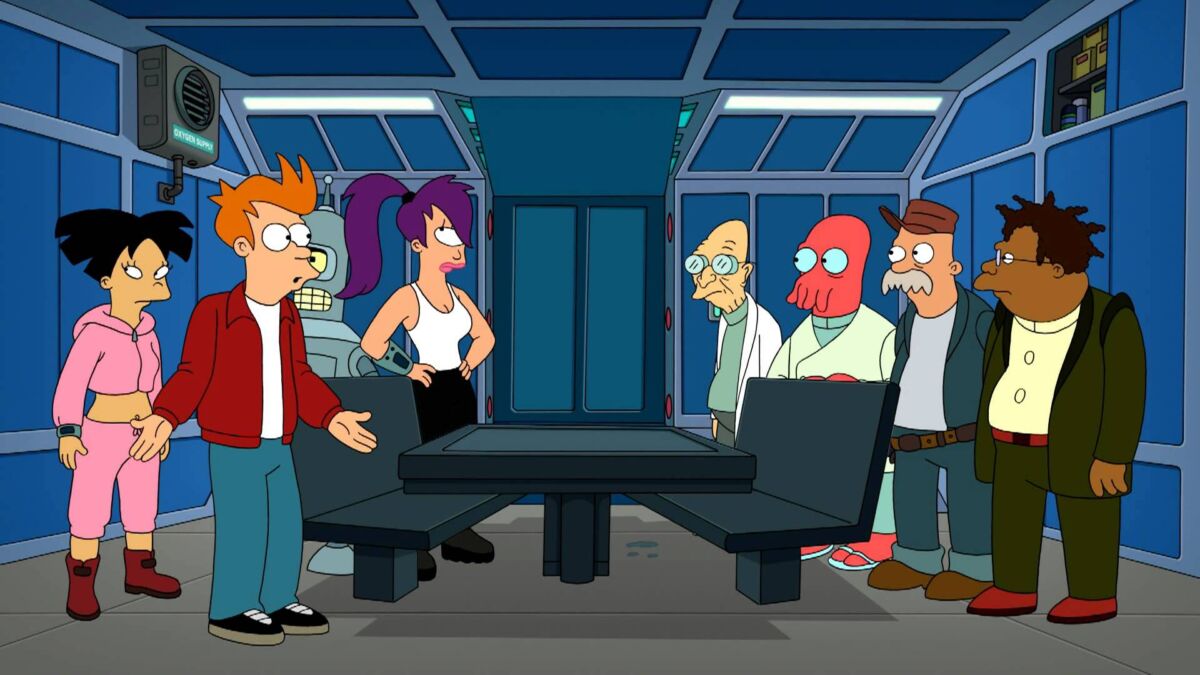
“There, see? I didn’t use your toothbrush.”
“You stole my kidney!”
“Don’t try to change the subject.”
The final season of Futurama wasn’t a patch on the show’s truly Halcyon Days, but it did throw up some very decent showings towards the end of its run, the last four episodes (Game of Tones, Murder on the Planet Express, Stench and Stenchability and Meanwhile) all standing out as worthy of inclusion on this list. What an honour.
A team trust retreat descends into chaos as a shapeshifting alien inhabits the Planet Express ship and starts picking off crew members one by one a la The Thing, and it’s up to each disillusioned pairing to work together in order to get through the harrowing ordeal.
You can see most of Murder on the Planet Express’ twists and turns coming a mile off, and there’s almost no originality left to be found in parodying Agatha Christie, Alien or the Thing, but what Murder on the Planet Express does give you is structure, a tight, cohesive setup that places its central protagonists in one area with a unifying goal and lets the narrative move forward unabated. The result is an episode that is equal parts funny, fast and satisfying, using its premise to maximum effect and offering a chance for many of the show’s main duos to interact under extreme duress.
18. Leela’s Homeworld | Season 4, Episode 5

“I’m sorry you had to see that, Fry. Usually, I keep my sadness pent up inside where it can fester quietly as a mental illness.
“Yeah. That’s what I do with my stupidness.”
Leela’s mysterious parentage is finally revealed in Season 4’s fifth episode. When Bender’s waste disposal business ends up dumping huge quantities of toxic waste into the mutant-infested sewers, its inhabitants drag Bender, Leela and Fry underground and sentence them to be dumped in a toxic lake, only for two hooded mutants to rescue them from their fate. No prizes for guessing who they are.
The question of Leela’s parentage had been one of the show’s more intriguing subplots, with A Bicyclops Built For Two hinting at an alien lineage, but Leela’s Homeworld confirms her true identity as the one-eyed offspring of two unfortunate mutants living under the streets of New York City itself.
It’s still a funny episode, of course, but the thought of two parents sacrificing precious time with their only daughter and only being able to look out for her from the shadows of their subterranean dwelling is one of Futurama’s most affecting images. Like with many of the show’s episodes, it’s the ending of Leela’s Homeworld that tugs on the heartstrings with just the right amount of force.
17. The Why of Fry | Season 5, Episode 8
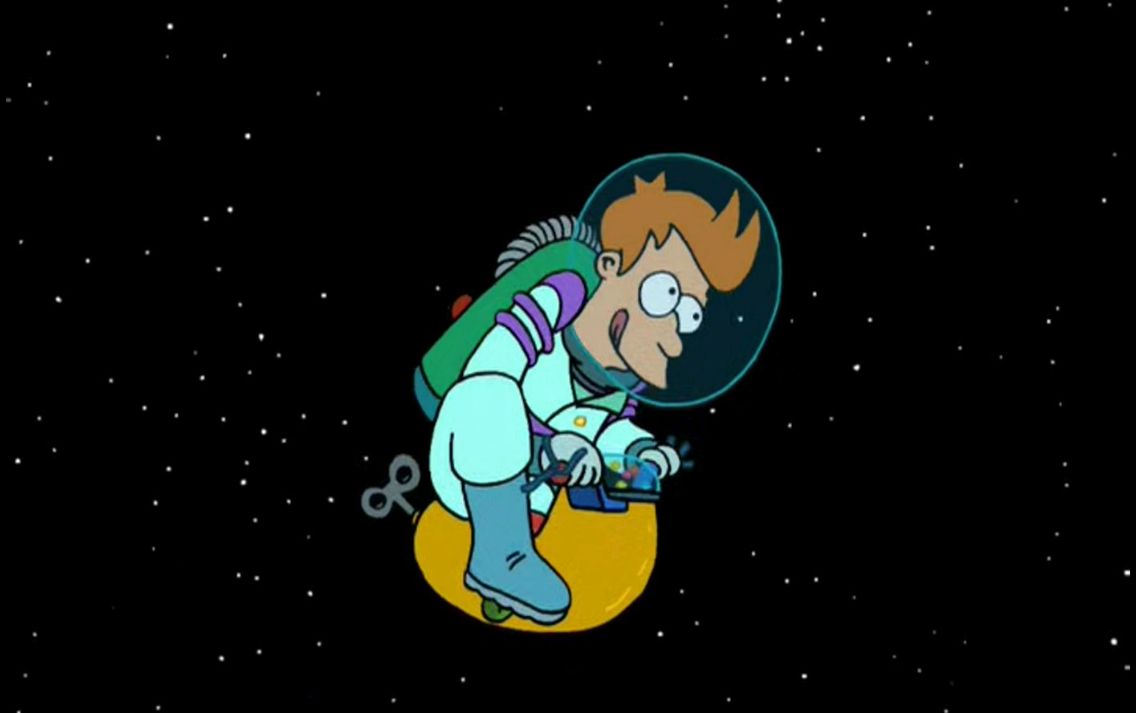
“You know what, Fry. I don’t care if you’re not the most important person in the universe. It really makes me happy to see you right now.
“Then I am the most important person in the universe.”
Fry’s importance to the Futurama-verse was never in question, but it’s The Why of Fry that really starts to unravel just how integral he is to the fate of the entire universe.
With Leela out on a date with a pig-headed mayor’s assistant, Fry learns from Nibbler that his accidental freezing was premeditated by the Nibblonians in order to thwart the deadly Brainspawn’s plan to erase the universe.
The best part of The Why of Fry is its attention to continuity and how rewarding it is for series fans to see the strands laid down coming together into an episode that makes perfect sense with regard to what went before it. The fact, for instance, that Nibbler’s shadow is in fact present in Space Pilot 3000, indicating that the writers were always planning on including the Nibblonian narrative, is an impressive touch.
With ties to The Day the Earth Stood Stupid, Roswell That Ends Well and the pilot itself, The Why of Fry proves that animated creations can till take the time to construct meaningful continuities.
16. Anthology of Interest I | Season 2, Episode 20
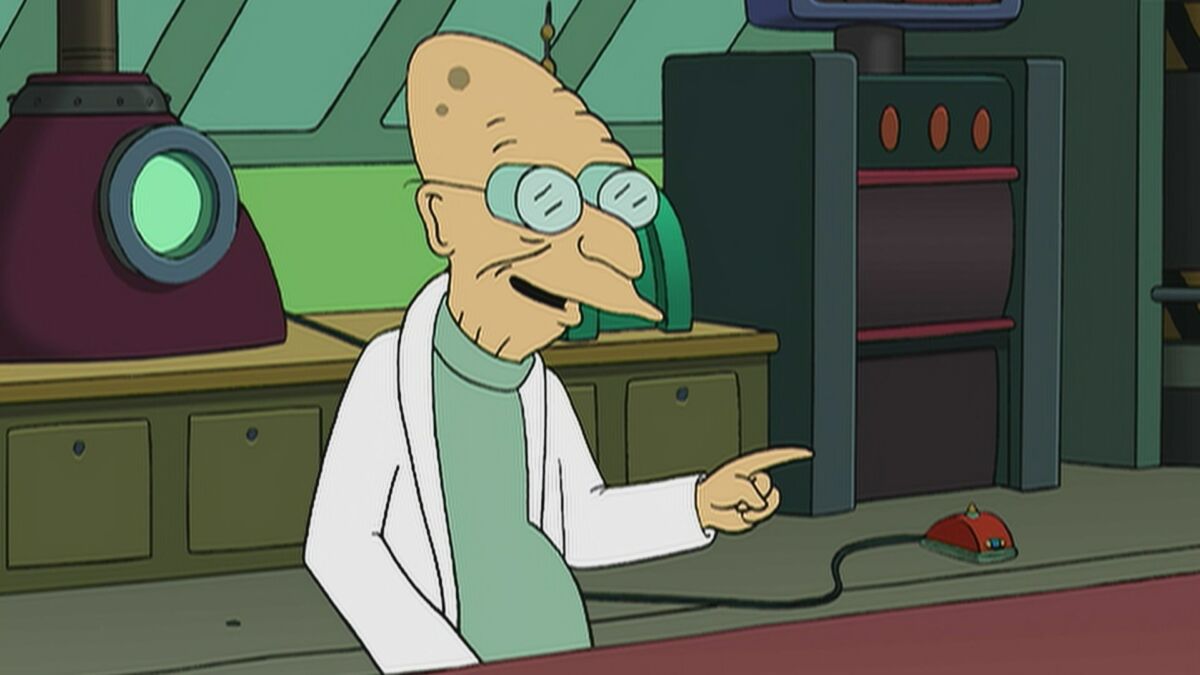
The first of the two Anthology of interests is without question the better. Airing in the summer of 2000 features three storylines: Terror at 500 Feet, Dial L for Leela and The Un-Freeze of a Lifetime. The first minisode explores, rather arbitrarily, what things would have been like had Bender been made into a giant robot, while Dial L for Leela is a fun exploration of the one-eyed captain’s more psychotic tendencies.
The best aspect of Anthology of Interest I, however, is undoubtedly ‘The Un-Freeze of a Lifetime’, the episode’s final chapter in which Fry posits what would have happened had he not been frozen and sent forward to the future. By failing to meet his cryogenic fate, Fry ends up messing with the space-time continuum, causing him to become a person of interest to the ‘Vice Presidential Action Rangers’, Al Gore’s team of time-preserving superstars. Made up of Gore, Stephen Hawking, Nichelle Nichols from Star Trek, Gary Gygax of Dungeons and Dragons fame and the supercomputer Deep Blue, it is the presence of Gore’s mismatched Rangers that makes The Un-Freeze of a Lifetime so watchable.
15. Lethal Inspection | Season 7, Episode 6
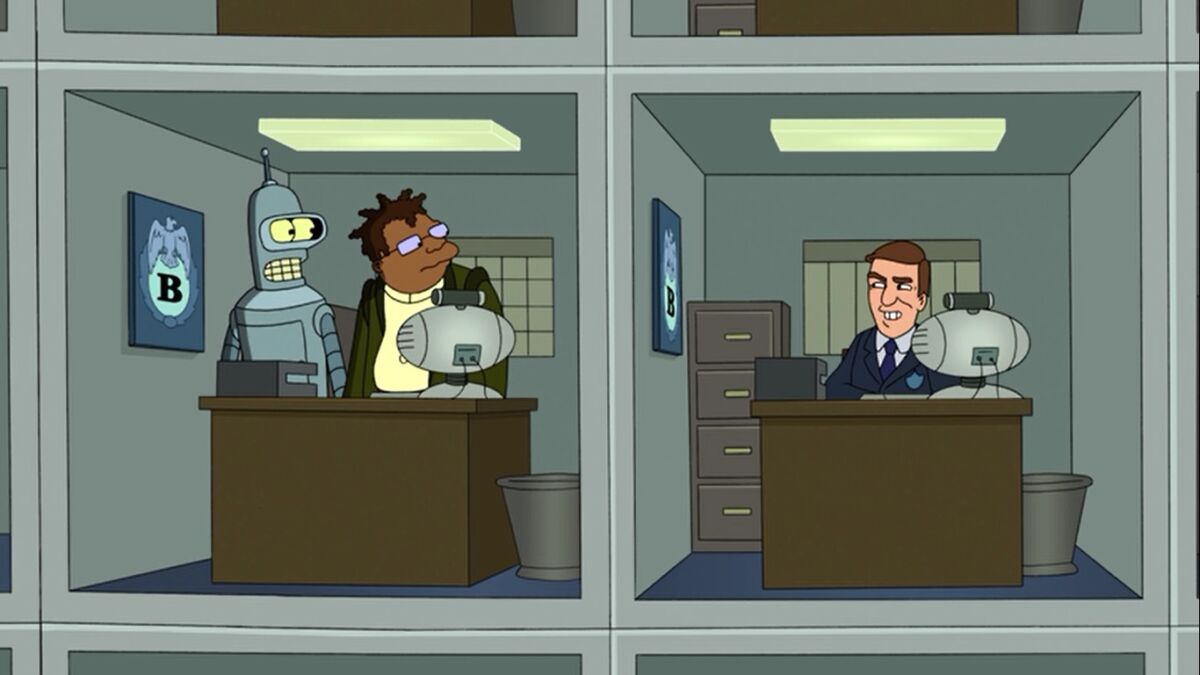
“I can’t run anymore. I’ll have to skip!”
There’s a lot of existential angst running through the excellent Lethal Inspection, in which Bender discovers that his lack of a backup renders him mortal, leading him and Hermes to travel to Mexico on the hunt for the inspector whose failing rendered his life ultimately finite.
Lethal Inspection may be the only episode in the entire Futurama canon that pairs Hermes Conrad and Bender together as a double act and gives them their own bespoke narrative adventure to explore. Despite primarily revolving around Bender coming to terms with his own mortality, Lethal Inspection is perhaps more revelatory about the nature of Bender’s Rastafarian bureaucrat companion. How Hermes Requisitioned his Groove Back may have given Hermes the spotlight, but it is Lethal Inspection that allows him to exhibit something akin to very un-bureaucratic character development.
Like the show’s truly top-tier instalments, Lethal Inspection’s ending is another genuine tear-jerker.
14. The Farnsworth Parabox | Season 5, Episode 10
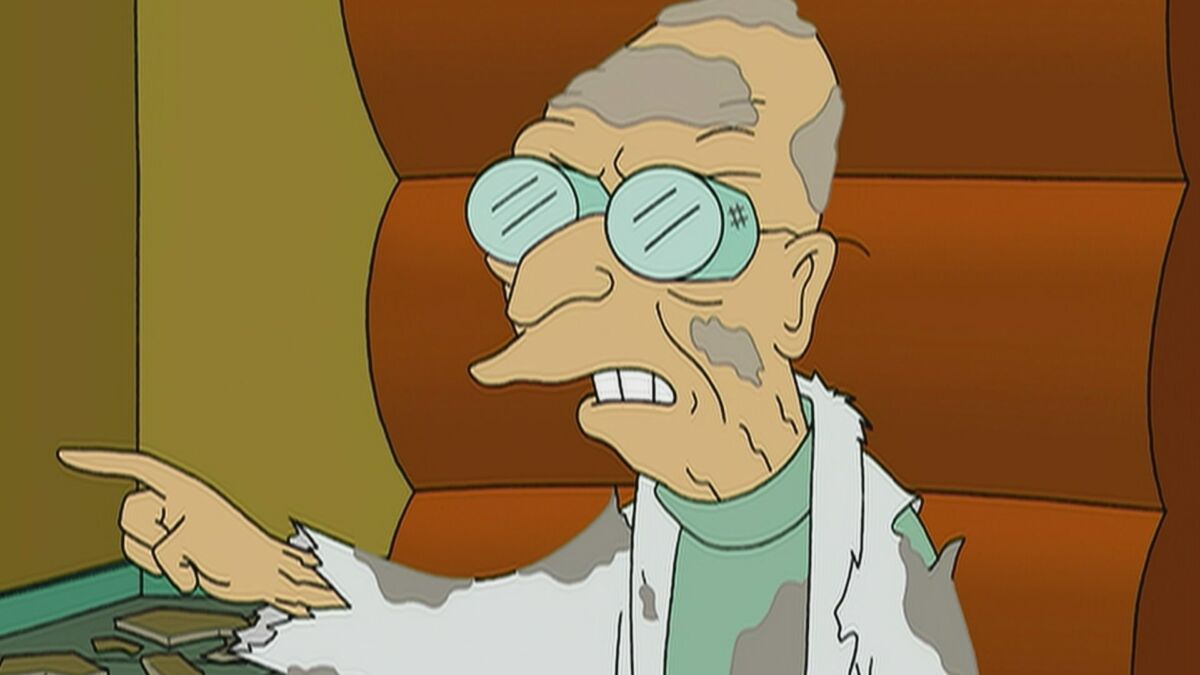
“Yes, it’s the Apocalypse alright. I always knew I’d have a hand in it…”
Before Rick and Morty came along and made the idea of interdimensional travel sexy, we had Professor Farnsworth and the rest of the Futurama gang condensing big physical and philosophical questions into satisfying 22-minute instalments for the whole family to enjoy.
The Farnsworth Parabox is a superb offering from Season 5 which sees Planet Express’s eccentric Professor Farnsworth creating an alternative universe contained entirely within a small cardboard box, a universe that, as it turns out, happens to house the original universe by the same means.
The Farnsworth Parabox is a great exploration of its premise, posing big philosophical and existential questions about reality. Like so many of Futurama’s finest outings, it’s an episode that blends seamlessly the big-brained, high-minded concepts of inter-dimensional travel with outright silliness with ease. The sequence in which the two parallel crews seek out one another’s boxes in order to retrieve them and return them to their own dimensions is a fantastic play on the idea. Rick and Morty clearly owes it a huge debt.
13. Godfellas | Season 4, Episode 8
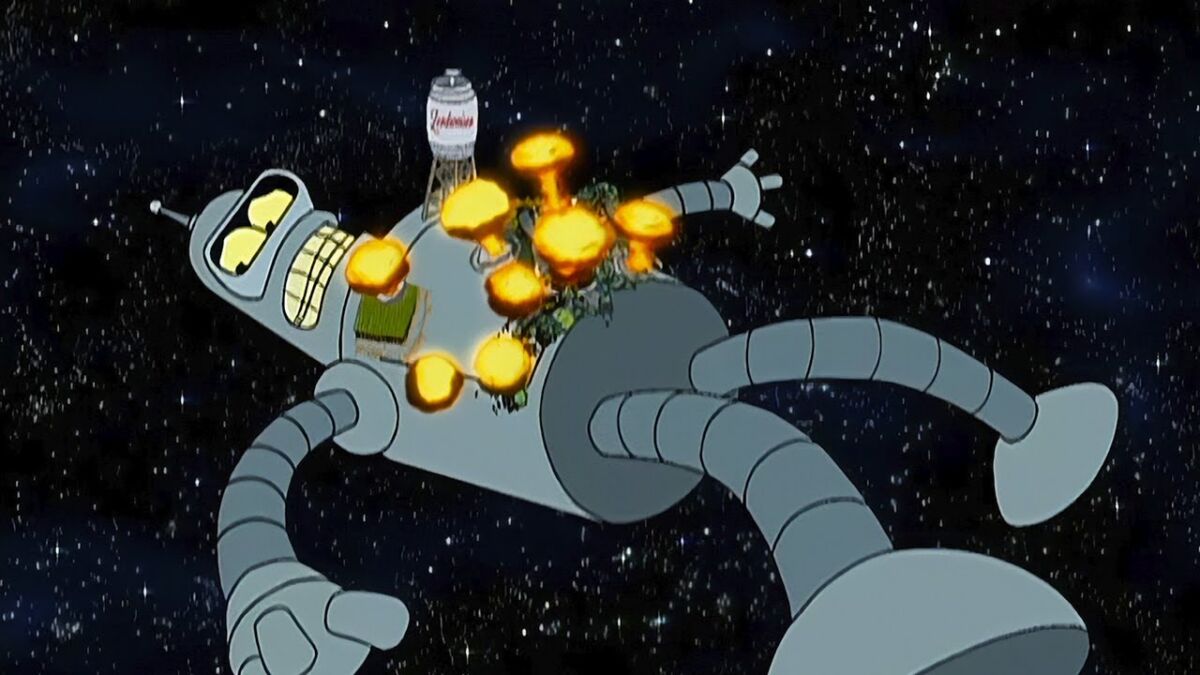
“Is there anything religion can do to help me find my friend?”
“Well, we could join together in prayer.”
“But is there anything useful we can do?”
“…no.”
Never afraid to tackle the major issues, Godfellas sees the writers of Futurama abandoning all pretence and going after the Big One: The Almighty God.
After the crew of the Planet Express are set upon by intergalactic pirates, Bender is accidentally fired out of the ship’s torpedo tube and into the endless vastness of space, destined to float alone for eternity and contemplate the meaning of existence. As he floats, however, Bender notices that a species of intelligent alien organisms calling themselves ‘Shrimpkins’ have started to develop on his shiny metal case.
Despite Bender’s (surprisingly) good intentions, most of his attempts at divine intervention end up exacerbating the problems of a society increasingly moving away from its idyllic nascent roots. Godfellas is an interesting meditation on the idea of an accidental God, a seemingly all-powerful being whose flaws and foibles make him as much of a hindrance to the civilisations he hosts as he is a benefit. In examining our relationship with God, morality and the meaning of existence in just 22 minutes, Godfellas manages to pack a pretty mighty existential punch.
12. The Problem with Popplers | Season 2, Episode 18
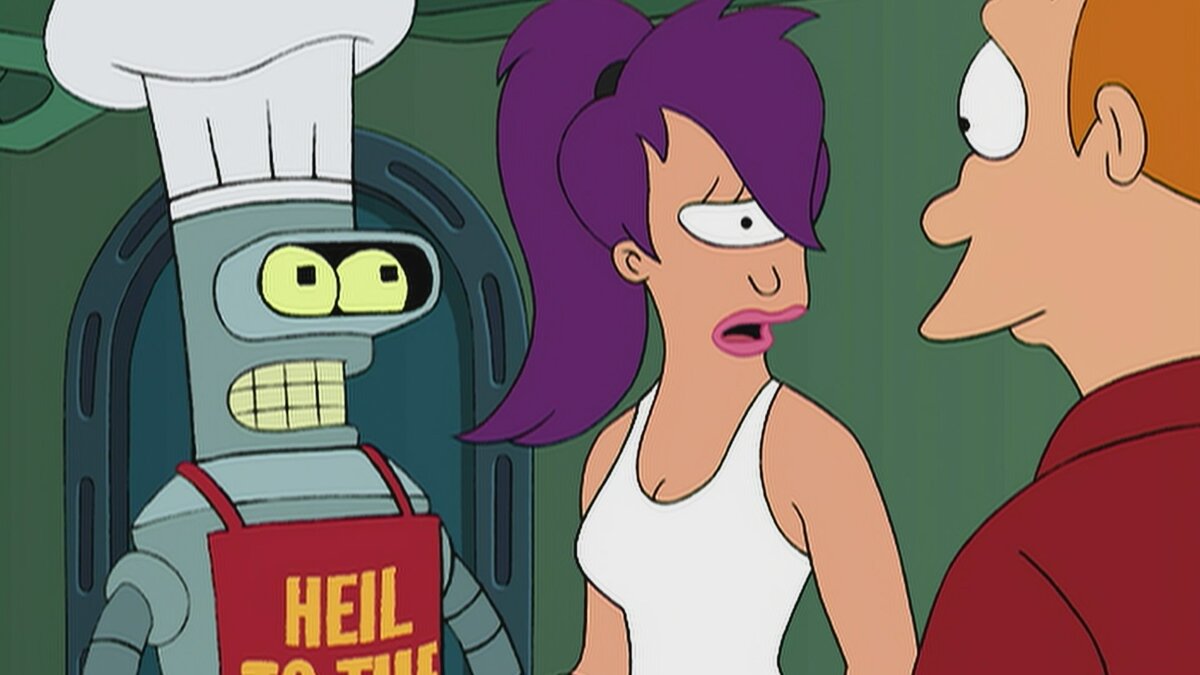
“Popplers are no smarter than any other animal I’ve served, and that includes cats.”
When the Planet Express crew stumbles upon an unbelievably delicious new food while exploring a distant planet, the novel snack becomes a phenomenon. Things get complicated, however, when Leela discovers that the inhabitants of Earth have been munching on the sentient offspring of a powerful and intelligent alien race.
The Problem with Popplers most likely isn’t a directly anti-meat diatribe or a polemic on the virtues of vegetarianism, but it certainly has the capacity to make audiences reconsider their nature with animals, nature and the foods they’re eating. When Leela discovers that a delicious new foodstuff is in fact capable of articulation and thought, she still faces an uphill battle to convince the enamoured and gluttonous general public to abstain from their consumption.
Pro-meat or not, The Problem with Popplers is certainly an effective commentary on how big businesses can spread lies and malicious false information in order to prevent damage to their reputations and therefore sales, manipulating or falsifying evidence to protect their own interests. Think about that the next time you go to KFC.
11. The Prisoner of Benda | Season 7, Episode 10
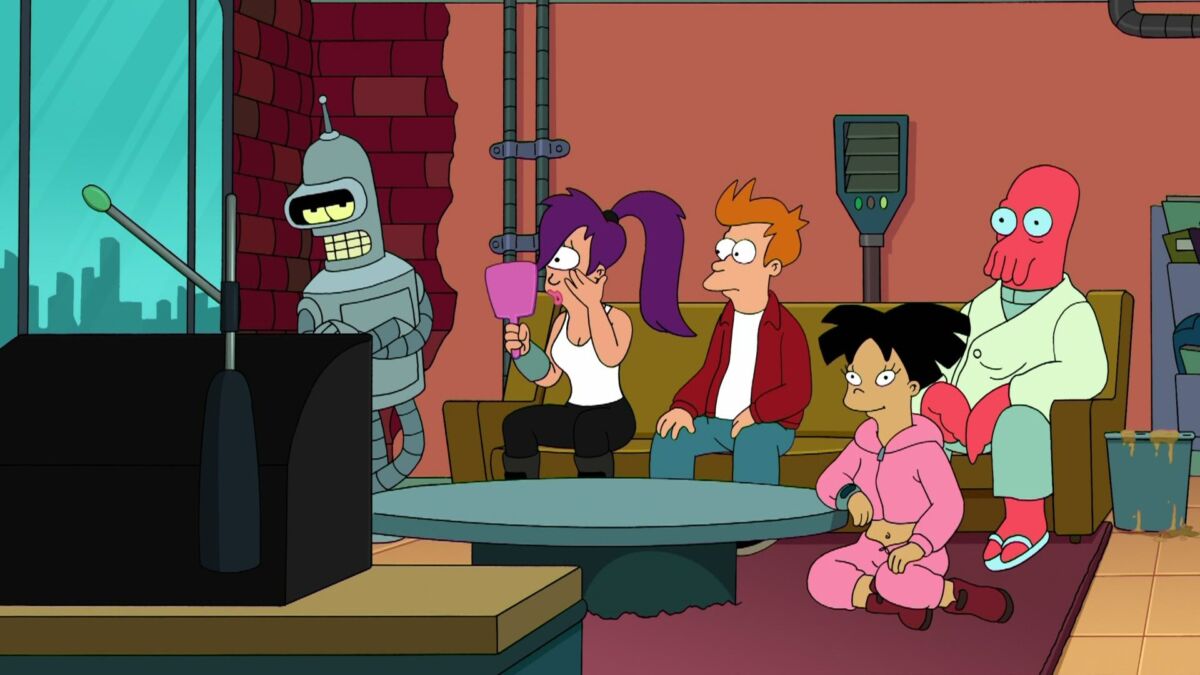
“As a man enters his eighteenth decade, he thinks back on the mistakes he’s made in life.”
“Like the heaps of dead monkeys?”
“Science cannot move forward without heaps!”
Making a decent episode of a retro-sci fi animated show is an admirable achievement in its own right. Making a decent episode of a retro-sci fi animated show while proving a complex mathematical proof regarding group theory is nothing short of remarkable.
The Prisoner of Benda starts off with a relatively simple setup: Bender wants to steal a visiting aristocrat’s jewels but no one will be his accomplice, and Professor Farnsworth has just invented a machine that enables body swapping. You can see where this is headed.
Enter Ken Keeler, Futurama writer and PhD-level mathematician to take the tired body swap formula and push it through absurdity and out the other side. The Prisoner Benda is a body swap episode with a twist, as Professor Farnsworth’s switching device doesn’t allow a single pair of bodies can swap minds more than once, instead requiring two additional individuals to act as switchers. Essentially, Keeler’s episode looks to prove that after any given sequence of switches, each brain can be restored to its original host by adding two further individuals who haven’t yet switched minds. Sigh. Just watch the episode.
10. Teenage Mutant Leela’s Hurdles | Season 5, Episode 7
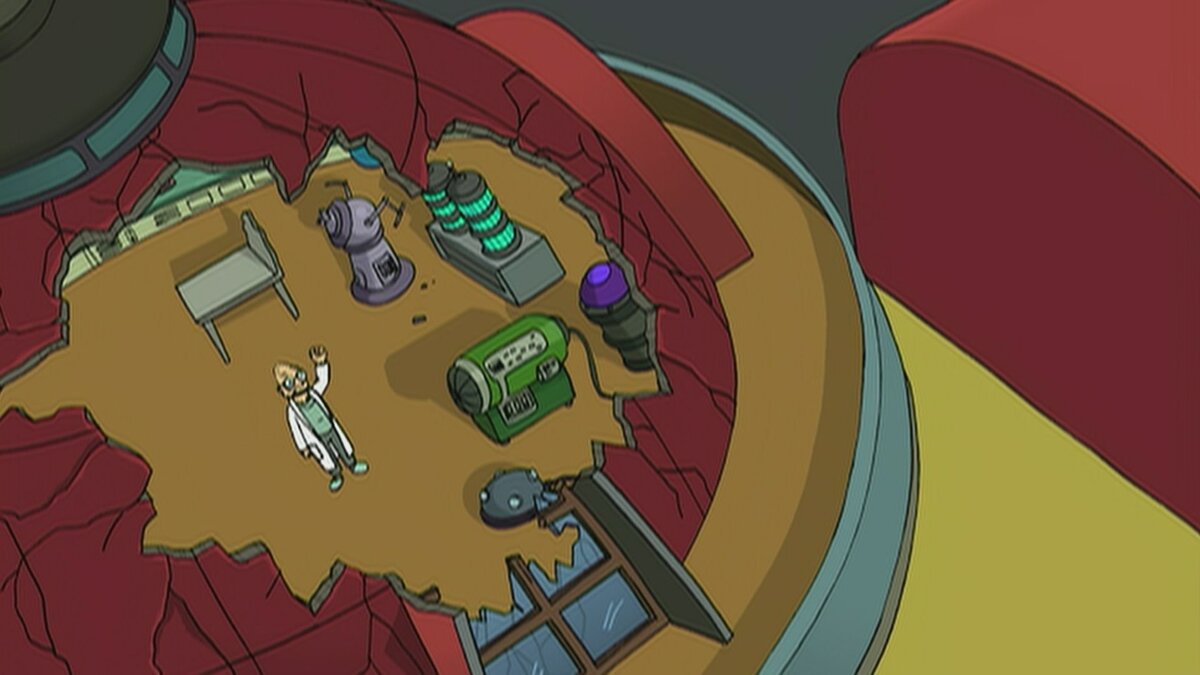
“With my last breath, I curse Zoidberg!”
When a TV show decides to de-age its central protagonists for a one-off, juvenile-centric outing, it’s usually time to bust out the remote and skip through to the next episode. Usually a plague of adult animation, it’s hard to think of an instance where proceedings are rendered funnier or more charming by dialling the clock back and reducing a show’s beloved stars to gurgling infants for 22 minutes.
Teenage Mutant Leela’s Hurdles, however, puts a fantastic spin on the conceit that turns it into one of Futurama’s best showings. When the entire crew are covered in a regenerative tar with the power to slow the ageing process, the Professor and his rapidly de-ageing crew must race to reverse the effects before they degenerate into non-existence.
It’s a clever, high-stakes concept that adds a ticking clock element of genuine tension to what is already an extremely funny episode. The real delight, however, is seeing Professor Farnsworth anachronistically fall back through the phases of his own existence, each generation he passes back through characterised by the ludicrous fashions and verbal affectations of the 20th Century cultural zeitgeists he was never even party to. Absolutely gag-filled and brimming with personality, Teenage mutant Leela’s Hurdles is easily one of the show’s funniest episodes.
9. Amazon Women in the Mood | Season 3, Episode 5
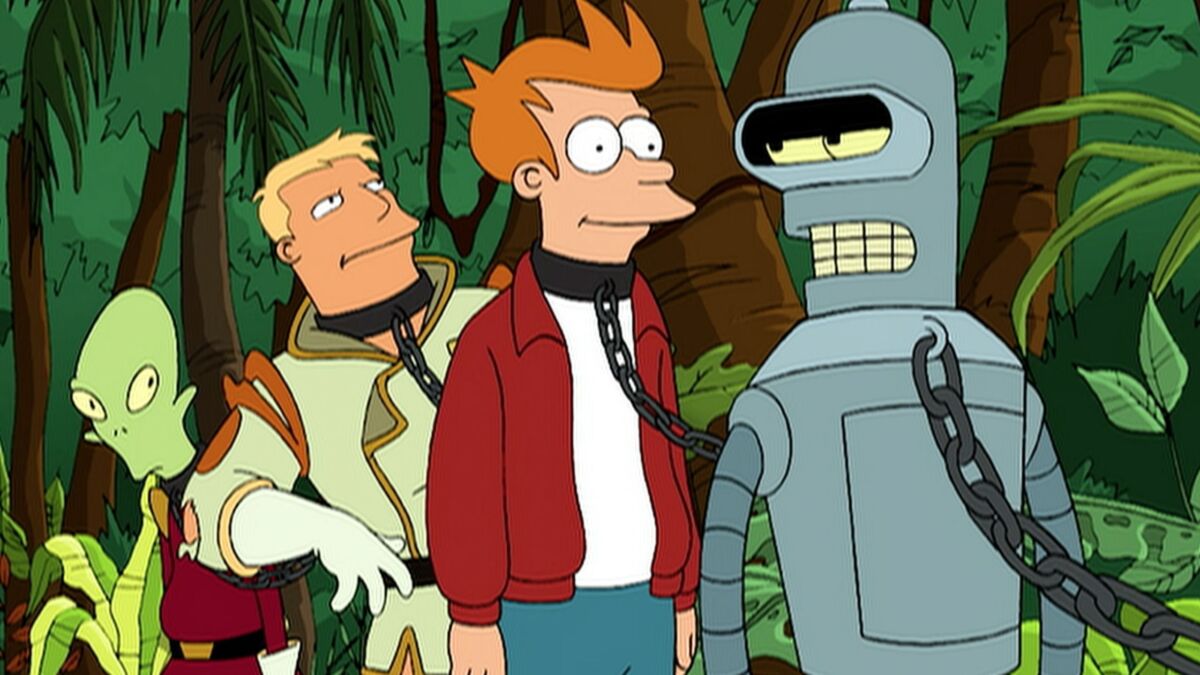
“Silence! You want to die like last men visit Amazonia?”
“What did they die of?”
“Crushed pelvises.”
Amazon Women in the Mood might come across as a little outdated to modern audiences, the image of incredibly large, furrow-browed Amazonian women forcing their (eventually) reluctant captors into sexual congress looking just a tad suspect in the post-MeToo era. Nevertheless, the arguable standout episode from Season 3 is a hugely enjoyable romp that, with its tongue in its cheek, tackles gender politics in the most enjoyable ways, flipping the script as the block-headed Amazonians make Fry, Zapp and Kipp their sexual slaves.
Perhaps the episode’s crowning achievement is the legendary Bea Arthur’s appearance as the voice of Fem-puter, an apparently all-knowing contraption with a fixation for prefixing words with -femme and barking overzealous proclamations to her Amazonian subjects. The idea of a legendary screen and theatre actress, at the time approaching her 80s, sitting in a sound booth, speaking in the third person and shouting lines such as “death…by snu snu!” is perhaps the funniest part of an already immensely enjoyable outing.
8. Parasites Lost | Season 3, Episode 4
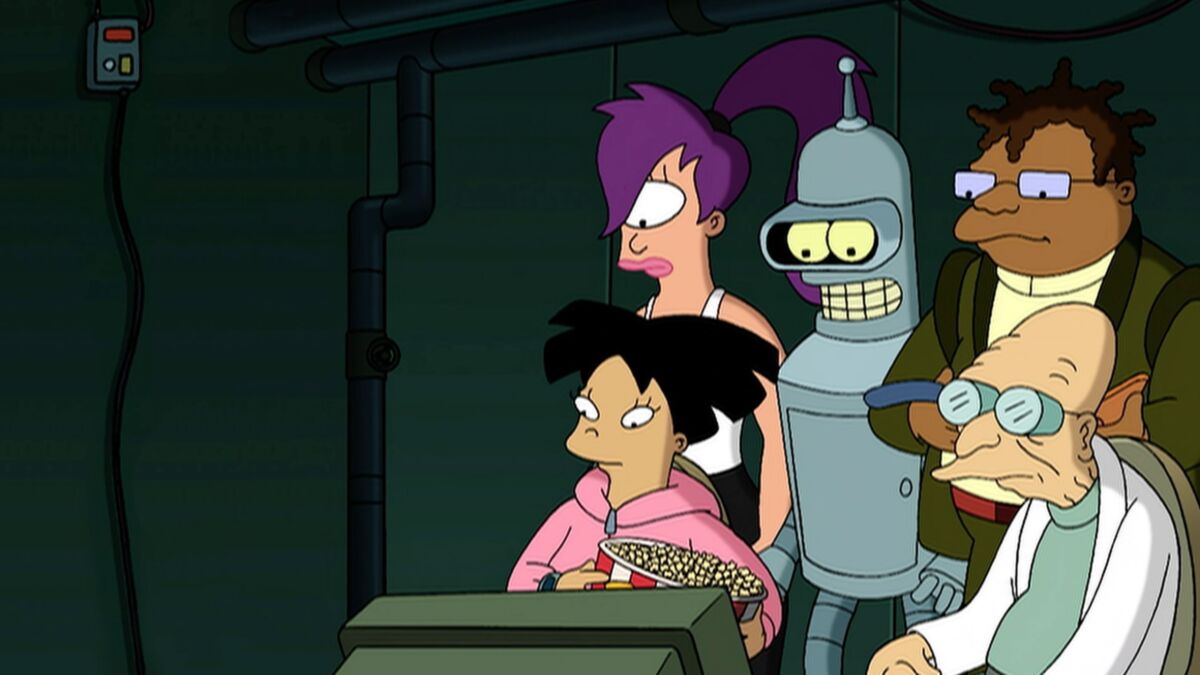
“Ugh, it’s like a party in my mouth, and everyone’s throwing up!”
Drawn from Futurama’s excellent third season, Parasites Lost represent the show really beginning to hit its stride in earnest.
When Fry eats an egg sandwich bought at an intergalactic fuelling station, his body becomes infested with a host of parasitic worms. Rather than acting as a parasitic hindrance, Fry’s newly acquired micro-infestation makes him stronger, more intelligent and more resilient than ever before, his newly-acquired capacities finally allowing him to become the object of Leela’s desires.
Despite Leela’s attempts to keep the infestation and therefore keep Fry as the perfect specimen he has become, the latter begins to realise that Leela’s affection for him stems from the characteristics imbued on him by an external force rather than for his own intrinsic qualities. Fry’s inevitable decision to expel the worms and lose his chance at romance make for a sucker punch of an ending, but it’s a sincere testament to his character that he’s willing to sacrifice so much in order to preserve his own imperfect authenticity.
7. Meanwhile | Season 10, Episode 12
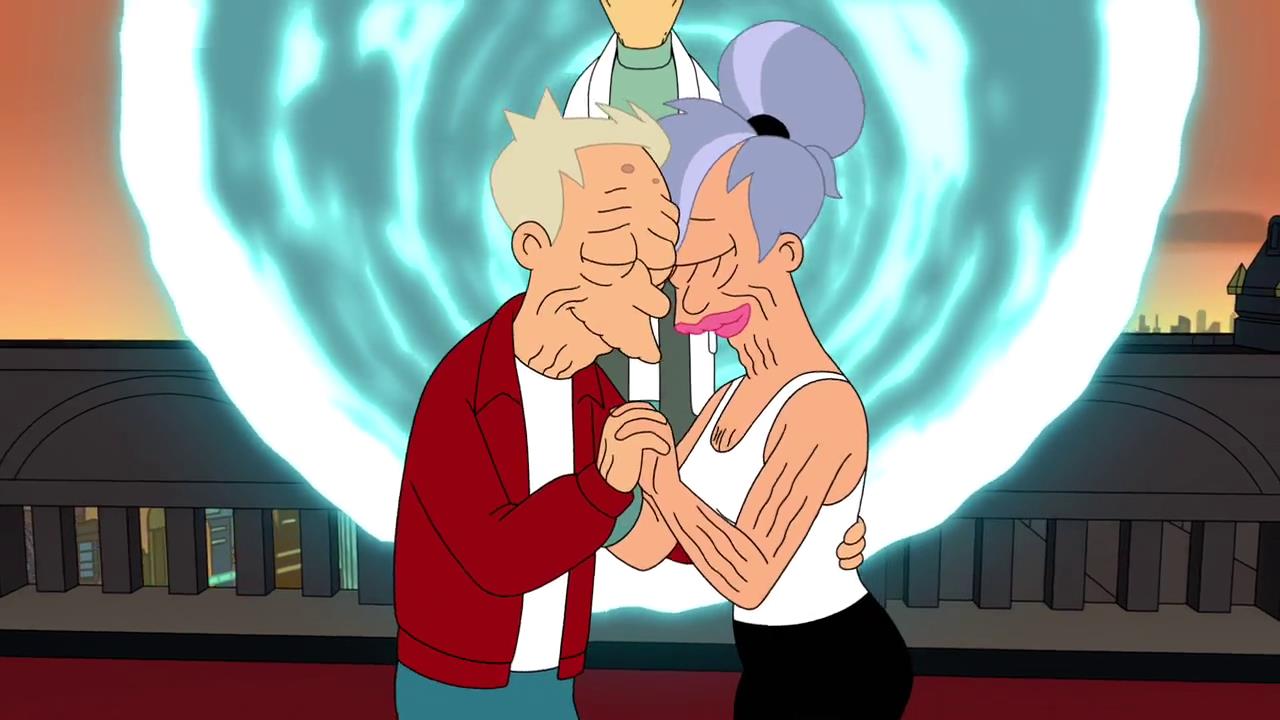
“What do you say? Wanna’ go around again?”
“I do.”
The end of Futurama. No ifs, buts or maybes, the final finale of a show that spent most of its life avoiding the swings of the commissioner’s axe. Meanwhile marks the last ever episode that will ever be made of the cult animated classic. Period.
Until the Hulu reboot, that is.
Over the course of its run (and multiple cancellations), the show’s writers ended up penning a number of ways for things to reach their narrative conclusion, but every single one was in some way or another concerned with the fate of its central pairing of Fry and Leela. Overclockwise, Into the Great Green Yonder and The Devil’s Hands Are Idle Playthings had all given the duo a degree of closure as each episode looked to tie up the entire show when its future remained somewhat uncertain.
Meanwhile, however, seems like the most cohesive effort, an episode that, in its closing stages especially, really does feel like a very definitive send-off as Fry and Leela travel the world together as the rest of humanity is locked in time stasis. As it turns out, even Meanwhile probably won’t end up as Futurama’s final conclusion, what with the decision for the show to be resurrected by Hulu in the near future – so once again, Fry and Leela’s ultimate fate may be open to yet another rewrite.
6. The Late Philip J. Fry | Season 7, Episode 7
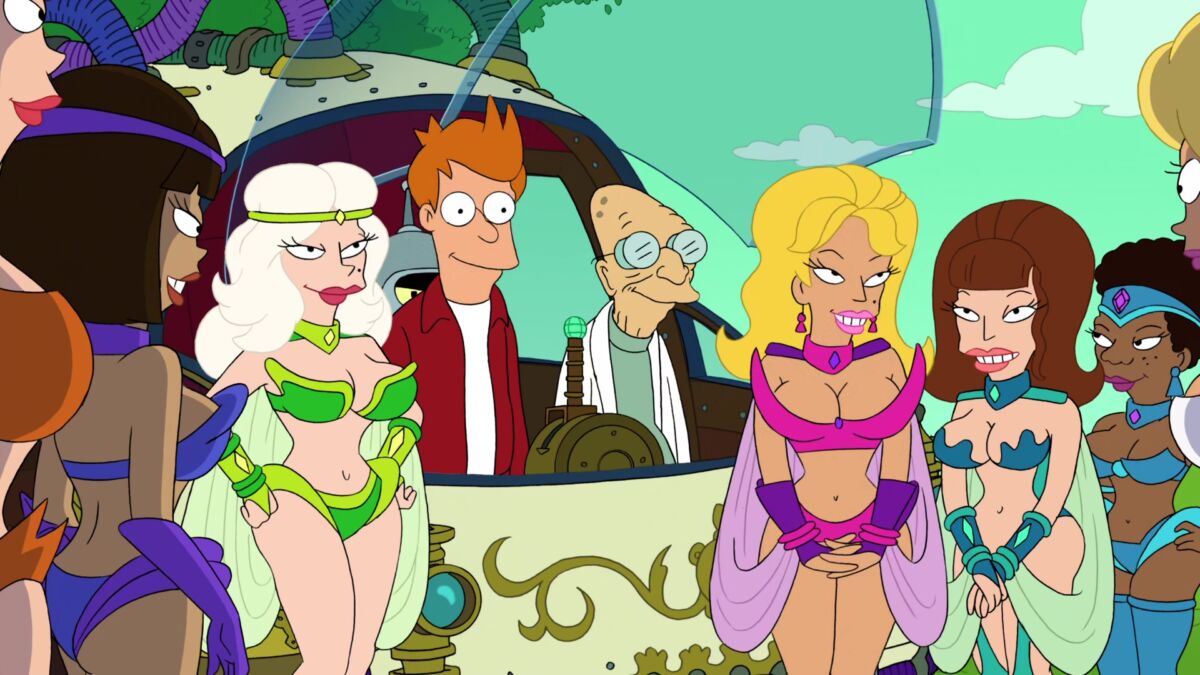
“In the year one million and a half, Humankind is enslaved by giraffes, Man must pay for all his misdeeds, When the tree tops are stripped of their leaves.”
Time travel wasn’t a device that Futurama ending up using a huge amount, the show pulling that particular card out rather sparingly but always with great effect. The Late Philp J. Fry sees the writers playing with the fourth dimension expertly as Fry is roped into travelling into the future in Professor Farnsworth’s new time machine right before he is supposed to be going on an important date with Leela.
As Fry, Bender and the Professor travel further into the future, however, it becomes clear that there is no clear way for them to return, pulling Fry further away from the object of his affection and providing the episode with an underlying narrative tension that really evokes the feeling of being yanked further and further away from a loved one.
The Late Philip J. Fry works so well because it uses time travel as a device to tell a more meaningful and intimate story while also exhibiting a raft of surreally possible futures ranging from giraffes enslaving humans to a post-apocalyptic wasteland. As is so often the case with Futurama, multiple distinct layers are always co-existing side-by-side, an undercurrent of sincerity and warmth playing under the superficial sci-fi trappings, all bolstered by a uniquely brilliant sense of humour.
5. Roswell That Ends Well | Season 4, Episode 1
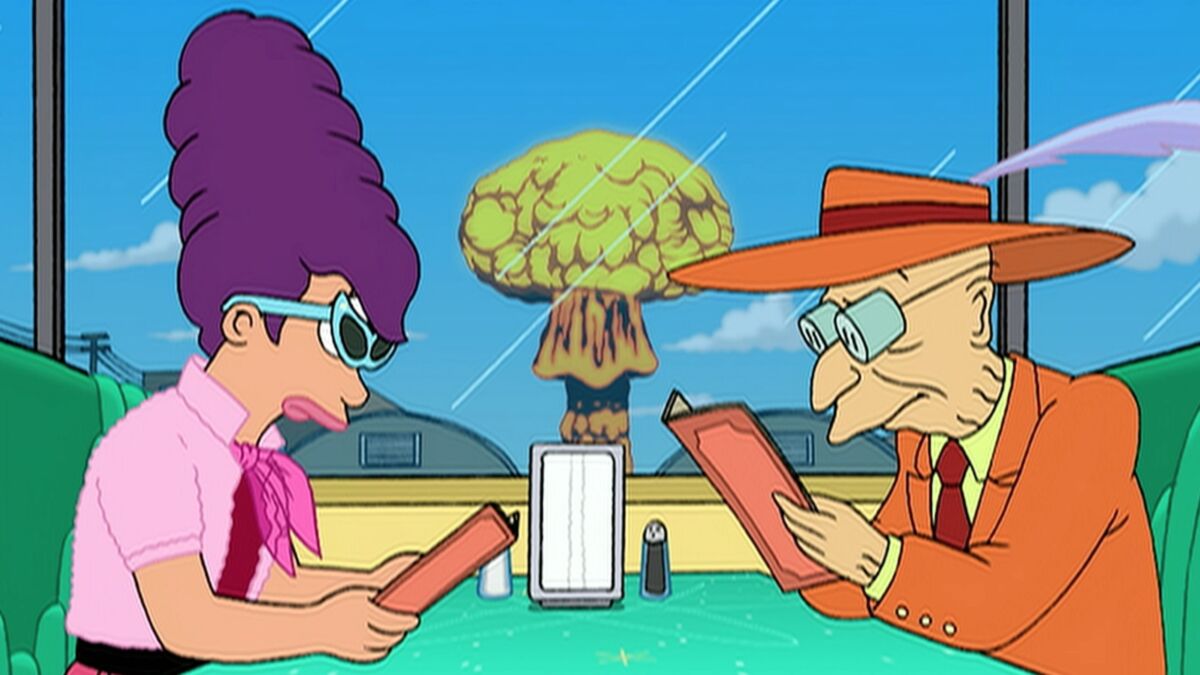
“If you come in peace, surrender or be destroyed. If you’re here to make war, we surrender.”
Roswell That Ends Well is probably the most disturbingly brilliant piece of television you can watch in the space of 22 minutes.
In it, the Planet Express crew ends up travelling back in time to Roswell, New Mexico, the crew’s various members becoming the very subjects of the infamous Roswell Incident of 1947. With Zoidberg captured by the American military and Bender’s smashed body being reconstructed to form what the Americans perceive to be an alien vessel, Fry takes it upon himself to find his grandfather, also stationed at Roswell, and prevent his untimely demise.
Nothing, of course, goes to plan, and in a turn of events that mathematicians and physicists will still be debating to this day if there’s any justice, Fry ends up becoming his own grandfather by, spoiler alert, sleeping with his 1940s grandmother. Whether or not Roswell That Ends Well makes even one iota of sense is for the boffins to decide, suffice to say that its central premise is, when you think about it, more disturbing than the endless genocides, military coups and alien sex parties of Rick and Morty put together. As always, Futurama did it first.
Roswell That Ends Well also has some significance in marking the point at which Futurama gained the acclaim it was so sorely due. The episode won an Emmy Award in the Outstanding Animated Program (Programming Less Than One Hour) category in 2002, not bad for a storyline revolving around impregnating your own grandmother. Surely an Emmy first.
4. The Devil’s Hands Are Idle Playthings | Season 5, Episode 16
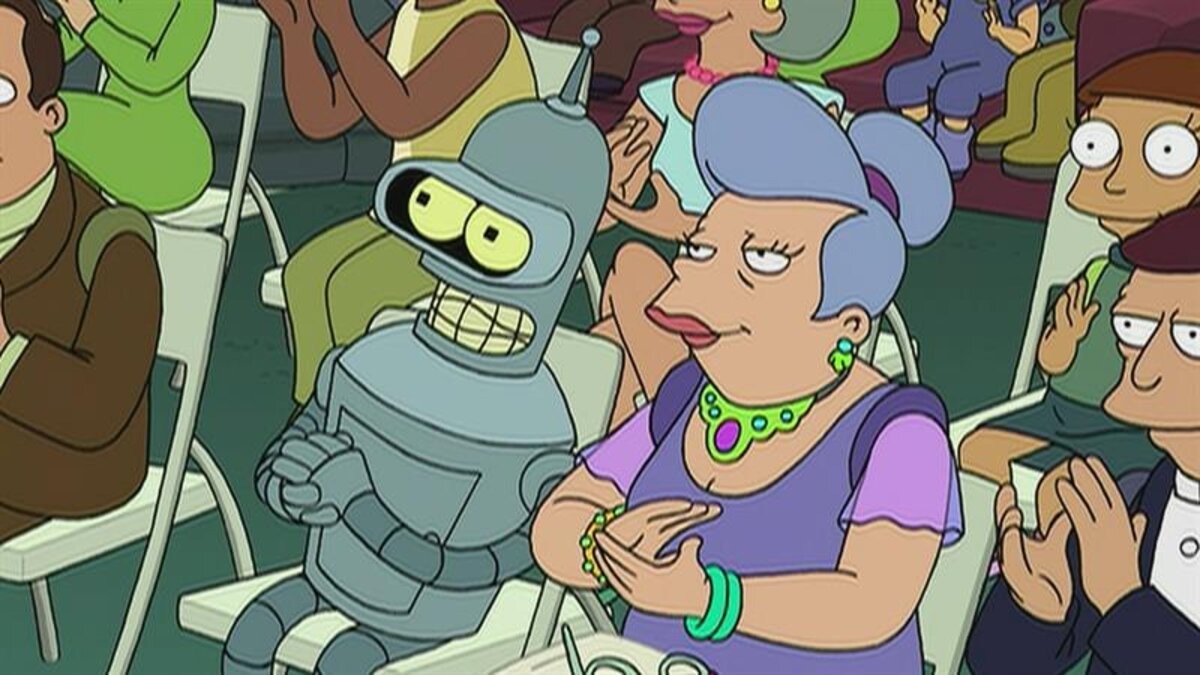
“The use of words expressing something other than their literal intention. Now that, is, irony!”
When Fry makes a Faustian pact with the Robot Devil for a pair of robot hands in order to better play the holophoner and impress Leela with an opera dedicated to her, it’s not long before the Devil is doing everything he can to ensure that Fry doesn’t keep his new mechanical mitts.
Musical episodes are often an excuse to give the skip button a work out, but The Devil’s Hands incorporates its musical themes beautifully into the narrative, culminating in a half-happening, half-staged opera that both parodies and champions the medium while providing a great narrative conclusion to the episode itself.
The Robot Devil is always a welcome addition to any Futurama episode, one of the most underrated and underutilised characters in the show’s extensive roster. Dan Castellaneta’s outrageous voiceover work makes the automated Satan a camp, outrageous delight, and his presence elevates a good episode into an utterly great one. As far as Futurama just being about having fun, The Devil’s Hands is a devilish delight.
3. The Sting | Season 5, Episode 9
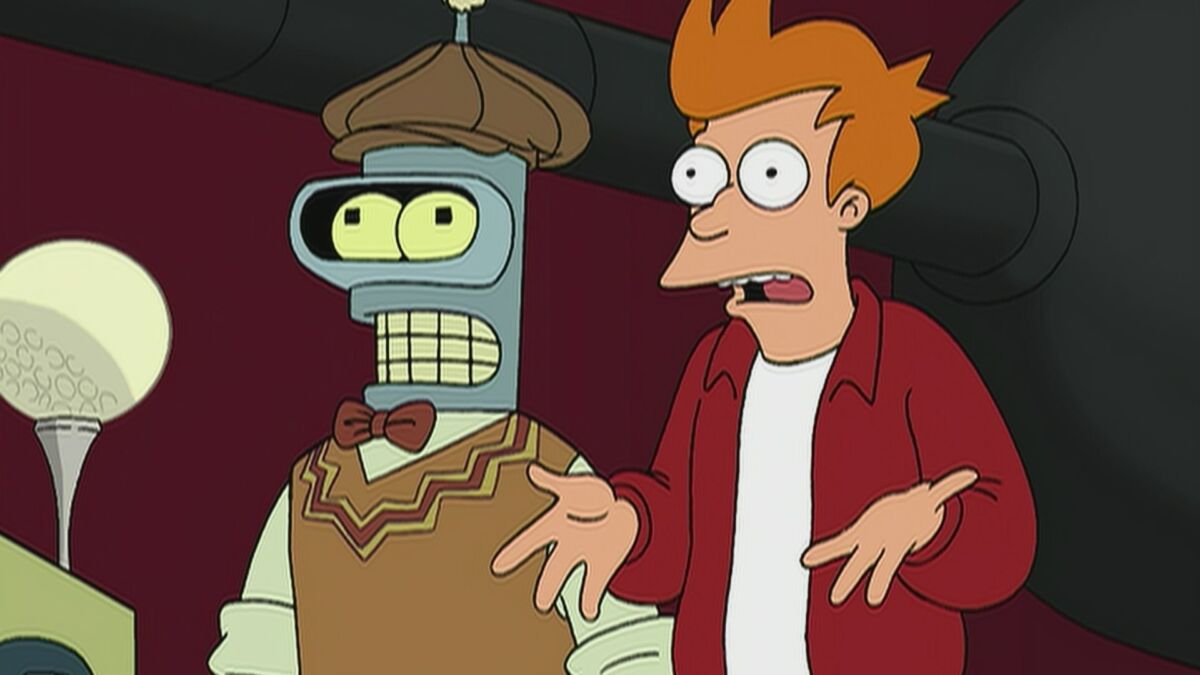
“Just wake up, Leela. Please. Just wake up.”
Futurama’s capacity to elicit genuine tears, both of laughter and of sincerity, have made it an animated classic. There are numerous episodes that have the capacity to make your eyes start watering more than being fired from the onion factory, The Sting being one of the cleverest, and most affecting, exponents.
What starts off as a routine journey to a hive full of deadly space bees to extract some precious honey ends up devolving into a surreal exploration of Leela’s shattering psyche as the mission goes wrong and Fry is killed by being impaled by a large stinger. Wracked with guilt over her companion’s death, Leela’s sanity begins to collapse as she experiences constant rifts in her own reality.
Tormented by visions of Fry and convinced that he hasn’t in fact passed away, Leela’s descent into turmoil and torment is as throat lump-inducingly painful as a stinger to the abdomen. The Sting’s eventual ending is an emotionally resonant and deeply satisfying twist that overwhelms the viewer with a sense of relief and closure.
A triumph of exquisite storytelling.
2. The Luck of the Fryish | Season 3, Episode 10
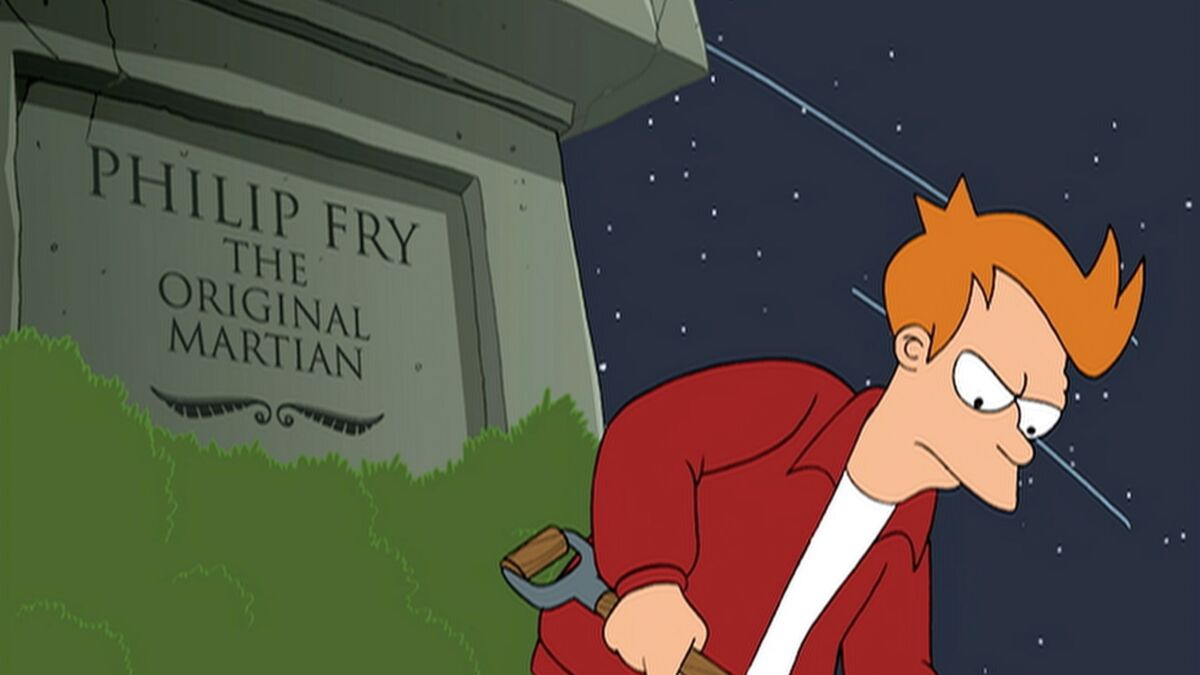
“I love you, Philip, and I always will.”
It seems as though nobody does sucker punches quite like Futurama.
The writers were, the more you look back on it, master manipulators, seeming to push a narrative one way before turning things around to smack viewers just when they’d dropped their guards. I was just here for some light-hearted sci-fi shenanigans, and 20 minutes later I’m lying on my bedroom floor crying like a schoolgirl.
The Luck of the Fryish is perhaps the prime example of this wonderfully vicious thread, an episode that paints things one way before pulling the rug out from everything and revealing a different story altogether. Using a back-and-forth narrative structure, Fry, frustrated at his consistent bad luck, attempts to recover his lucky 7-leaf clover after being convinced that his brother Yancy stole it and assumed Fry’s identity after he was transported to the future.
Spoiling the ending to The Luck of the Fryish does it a massive disservice, suffice to say it’s a fantastically emotional twist that is as well-earned as it is emotionally resonant. Luck of the Fryish consistently tops polls to find fans’ favourite Futurama episodes, and with good reason – it’s funny, high-concept and deeply moving, a perfect balancing act that doesn’t reveal all of its cards until the very end. On another day, it could easily have found itself occupying the number one spot on this list.
1. Jurassic Bark | Season 5, Episode 2
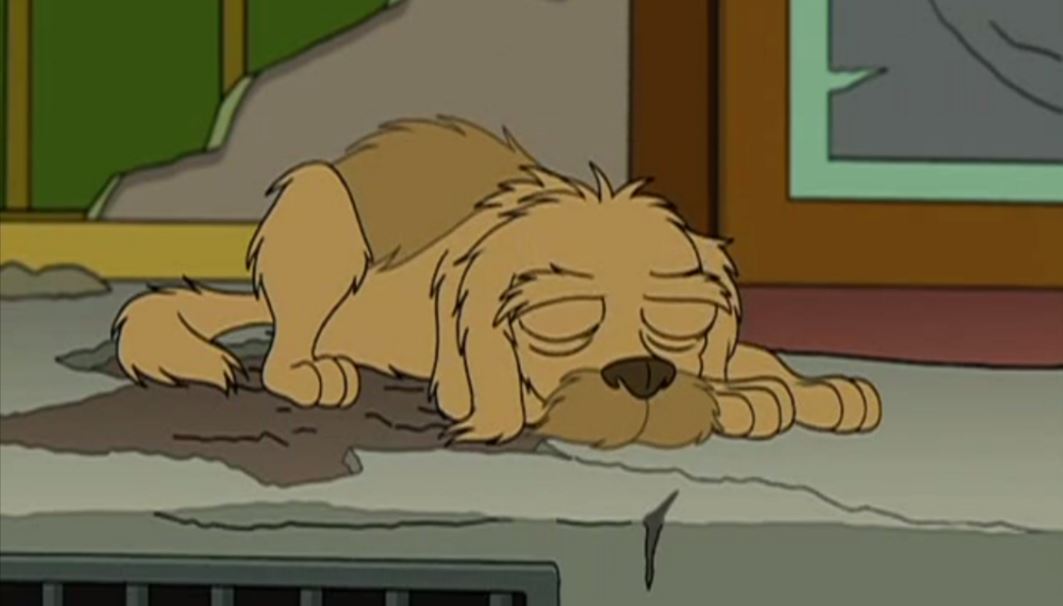
“I’ll never forget him. But he forgot me a long, long time ago.”
Jurassic Bark is the sort of episode that should come with a parental warning, something akin to ‘contains mild peril, moderate threat and scenes of devastating, gut-wrenching heartbreak’.
When Fry discovers the fossilized remains of his dog Seymour from his old delivery job, he is overjoyed to hear that Professor Farnsworth can clone the scruffy mutt and restore him to life in the 30th Century. While the decision initially seems obvious, Fry begins to question the ethical ramifications of bringing a 1000-year-old dog into the present day for what he perceives to be purely selfish reasons.
To those strange individuals who occupy the universe without much of a care for four-legged good boys, Jurassic Bark’s position at the top of the Futurama tree might seem like an odd choice considering its competition. For those of us who understand the joy derived from the greatest companions in the known universe, however, Jurassic Bark remains the finest testament to the love and loyalty that these creatures so often exhibit on a daily basis.
Without going into too much in terms of spoilers, the final 2 or 3 minutes of Jurassic Bark are practically rendered unwatchable as most people with a human soul will be viewing them through a haze of hot flowing tears. Watch Jurassic Bark at your peril, but know that it is honestly one of the most moving, sincere and heartfelt pieces of TV you may ever witness.
A worthy, heart-wrenching winner.
READ NEXT: How To End The Simpsons
Some of the coverage you find on Cultured Vultures contains affiliate links, which provide us with small commissions based on purchases made from visiting our site.
